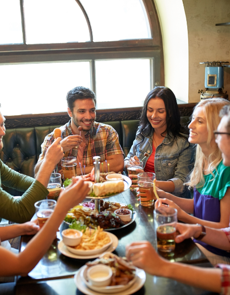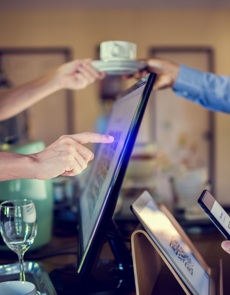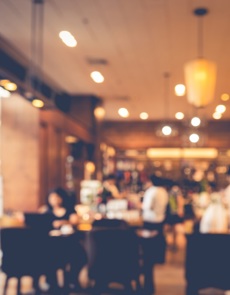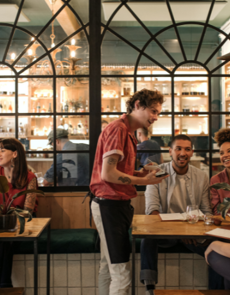Top 5 benefits of restaurant reservation system
The phone in your venue rings incessantly during peak hours, staff scramble to find open tables, and walk-ins face disappointment if you're fully booked. Sound familiar? Old-school reservation methods strain your resources and can hurt your bottom line.
The benefits of a restaurant reservation system extend well beyond simplifying the booking process. In today's fast-paced hospitality world, an online booking system is not a 'nice-to-have' feature but software that benefits both parties, with a strong focus on streamlining restaurant, bar and pub operations. It puts you in the driver's seat, allowing you to manage reservations strategically, frees up your staff's time and maximises the potential of every table in your venue, which we'll cover in depth below.
Here at Access, we often talk to operators who are looking to boost bookings and increase conversions in their venues, and as technology specialists, we work closely with our hospitality customers to help them find the best booking software solution.
In this article, we'll focus on the top 5 benefits of the restaurant reservation system. We'll demonstrate how it addresses common challenges like frustrating wait times and missed reservations. By the end of the article, you'll learn how to optimise your operations, personalise guest experiences, and make strategic decisions based on data.
But let's start from the basics and explore what is a restaurant reservation system.
What is an online restaurant booking system?
An online restaurant booking system is software that enables customers to reserve a table directly through a restaurant's website, social media pages, or dedicated booking platforms at a preferred time and date.
It's an all-in-one solution for managing reservations and optimising table layouts that replace the hassle of phone calls and in-person bookings, freeing up your staff's time and enabling customers to make reservations 24/7, even outside your operating hours.
Some booking systems can offer additional services- like collecting pre-orders, taking deposits or pre-payments, and they can integrate with a range of hospitality operational tools, such as restaurant EPoS, hospitality CRM or ticketing software.
In a few words - the booking system is a software packed full of features that can benefit your restaurant in many ways.
Benefits of a restaurant reservation system
Using a restaurant reservation system unlocks powerful tools for business growth, as it can help with:
- Customer convenience
- No-shows and table turnover
- Operational efficiency
- Collecting valuable data
- Marketing opportunities and growth
We outline these key benefits below.
1. 24/7 availability & customer convenience
Modern customers crave convenience. Did you know that over eight in ten, a staggering 86% of consumers prefer to book online? With so much of our lives operating online, choosing a venue is no different. Diners compare menus, browse photos, and easily check availability across multiple restaurants – if you're not online and you're not giving your diners the convenience of booking the way they want at the time they want, you might not even be considered.
Another reason why online booking is a preferred method of placing reservations is the rise of fully automated booking systems. These offer a range of features that elevate the experience for diners, including:
- Streamlined payment and pre-orders - the ability to secure a table with a deposit or pay in full upfront at the point of booking, potentially along with pre-ordering meals, takes the hassle out of settling the bill later and minimises wait times on the day.
- Flexibility for large groups - when booking for bigger parties, guests can easily manage their booking by having the option to join tables online.
- Automated waitlist technology - an extra functionality that allows guests to put themselves on a waiting list when their desired time isn't immediately available - they have a chance to snag a table if cancellations occur, all without having to call the restaurant repeatedly.
- Widened reach - seamless booking from third-party platforms means customers can find your venue through various online channels they're already using, such as DesignMyNight or Google, which can help increase your visibility.
2. Reduced no-shows and increased table turnover
An online booking system makes it easier for restaurants, pubs, bars, and other hospitality venues to manage reservations, but it can also help reduce no-shows.
By capturing the contact details from the customer at the time of booking, your reservation system will send automated reminders to your customers by email and/or text, prompting them to turn up. And if you add the functionality to collect deposits, customers have a stronger incentive to honour their booking or cancel well in advance, giving you the time to fill the tables.
Plus, with fewer no-shows, you can better manage your table flow and maximise seating throughout the night.
3. Improved operational efficiency
A good reservation system lets you see more than just bookings landing in your inbox.
Table management
A table management tool within your booking system is a digital interpretation of your dining space that lets you manage the available seats in your venue. It's useful especially when planning special events and periods - think large parties for Christmas dinners or creating more two-seater tables for Valentine’s.
Enquiry management
Your reservation system can work as a centralised inbox - the phone calls, emails, and social media messages asking about availability, menus, or special requests. It also allows you to set reminders and follow-ups and add labels to track the progress of enquiries, which can help increase your conversion rate.
Booking journey management
As well as managing the enquiries, some booking platforms allow to offer pre-orders, upsell offers, and promotions as part of the booking journey. Whether that’s adding a bottle of wine for the table to the booking or letting guests choose menu items before their visit, you can manage all the details from the booking system.
4. Enhanced customer experience & insights
Moving to an online booking system allows you to collect and instantly access a wealth of data - your guest preferences, contact details, birthdays and dining history. But this data isn't just sitting there – it unlocks a whole new level of service and strategic decision-making.
Personalised service
Instead of sending generic greetings, get to know your diner's favourite table, preferred drink, or dietary needs and provide a tailored experience that makes them feel special and makes their visit unforgettable.
The ability to offer personalised recommendations, exclusive offers, and targeted rewards not only enhances the overall customer experience but fosters a sense of appreciation and recognition. Since nearly half (49%) of UK guests seek personalised local experiences tailored to their previous booking history, it's how you make those diners feel like regulars, not just another reservation.
Building relationships
Knowing their preferences is a great start, but building relationships goes beyond remembering their favourite dish. Think of birthdays, anniversaries, or those little gestures for returning guests – that's how you turn customers into regulars and cultivate a sense of loyalty.
Your booking system can also be a powerful tool for rekindling connections with regulars who haven't visited in a while, as you can set up automated reminders ("We've missed you!") paired with special offers to entice them back – it's a minimal effort that can maximise those return visits.
More reviews
A friendly request goes a long way - guests are more inclined to share their experience when provided with an easy way to do so, and with 87% of consumers influenced by reviews when discovering local businesses, collecting reviews should be in your practice. The booking system is your way to streamline review collection by automating post-dining emails with links to popular review sites, such as Trip Advisor or Google Maps. Timing these requests shortly after their visit increases your chances of getting feedback. You can also include a quick follow-up survey within these communications, allowing for more focused feedback that can help you continuously improve.
5. Marketing opportunities and growth
Implementing a reservation system can also unlock powerful marketing tools and give you the ability to make data-backed decisions that maximise results.
Streamlining promotions & maintaining brand standards
If you're running multiple locations, you can easily launch promotions across all sites with a centralised booking system, ensuring brand consistency and simplifying your marketing efforts.
A unified booking system lets you manage pre-set menus, add-ons, or curated experiences – maintaining quality standards and delivering the same exceptional dining experience across all your sites.
Event management
Whether you’re putting on a brunch, a festival, or the next big immersive experience, you can streamline the logistics and open up new revenue streams. A booking system that integrates with ticketing software simplifies event planning, ticket sales, and guest management.
Comprehensive analysis
An effective booking system will help you maximise your marketing efforts by providing insights into your customer demographics, preferences, and booking behaviour. As we highlighted before, this data allows you to personalise your communications, but it reveals much more. You can identify peak booking times, popular promotions, and target audiences as well as make projections and predictions, ensuring your marketing efforts are data-driven and deliver maximum ROI.
A modern reservation system offers a plethora of benefits for both customers and restaurant operators, but like any technology, it comes with its advantages and disadvantages. However, it's important to be honest - not every venue needs a full-featured booking system. Let's explore some scenarios where simpler solutions might be more suitable.
When doesn't a hospitality business need a booking system?
There are a few scenarios where an online booking system might not be the best fit for a hospitality business:
- the type of business you're running
- volume of reservations
- location.
If your business focuses mainly on quick orders (coffee shops, food trucks or pop-ups), you’re in a heavy foot traffic area, or if your customers are mostly walk-ins or less tech-savvy, a booking system might be unnecessary overhead.
Some businesses thrive on a more casual, walk-in atmosphere and intentionally cultivate a relaxed and spontaneous vibe by exclusively catering to walk-ins. A reservation system could potentially disrupt that flow and add an unnecessary layer of formality.
An online booking system can also be a high business expense with a monthly cost to consider, so carefully weigh the benefits against your budget. Investing in a full-fledged reservation system might not be justified if it's not being used to its full potential.
Although an online booking system is an investment and not just an expense, in some cases, keeping things simple can be the best approach.
How can Access Collins help your business?
Our own booking system, Access Collins, encompasses all the business benefits we covered in this article, no matter the service industry you’re in: restaurants, hotels, pubs or clubs.
Access Collins is a cloud-based hospitality booking system and offers a core service - which is charged from £135 per site, which includes:
- Enquiry management – dealing with real-time bookings and enquiries coming through your website, social channels, Reserve with Google, or over the phone with automated email confirmations of enquiries and bookings.
- Table management - fully automated features including payments, pre-orders, the ability to join tables for larger groups and an automated waitlist (Access Collins LiveWait)
- Data reporting - this function enables you to analyse. performance at a site or group level and understand which channels are driving the most footfall and bookings.
- Multi-channel integration - allows you to accept bookings from third parties: DesignMyNight, Google, Fanzo.
There are also other functionalities that Access Collins offers as optional extras, including ticketing software and voucher products to enable restaurants to market special events.
The platform partners with the hospitality discovery website, DesignMyNight, showcasing restaurants and bars to over 3.9 million monthly visitors and its database of 500,000 newsletter subscribers helps promote your venue and get more bookings.
Ready to take the next step?
In this article, we explored the key benefits of a restaurant booking system for the hospitality business. The right software can unlock 24/7 customer convenience, help reduce no-shows, streamline operations, and provide invaluable data to enhance your service and marketing. Of course, we also considered the possibility of this system not aligning with your current setup or goals. Therefore, it may be beneficial for you to seek a different method and choose a solution that aligns perfectly with your business needs.
Access Collins is a user-friendly booking and reservation software designed to simplify operations for restaurants, pubs, and bars. Whether you're looking for a more efficient solution or exploring booking systems for the first time, speak to us about how our platform can help you streamline reservations, optimise your space, and deliver exceptional guest experiences.

 AU & NZ
AU & NZ
 SG
SG
 MY
MY
 US
US
 IE
IE









